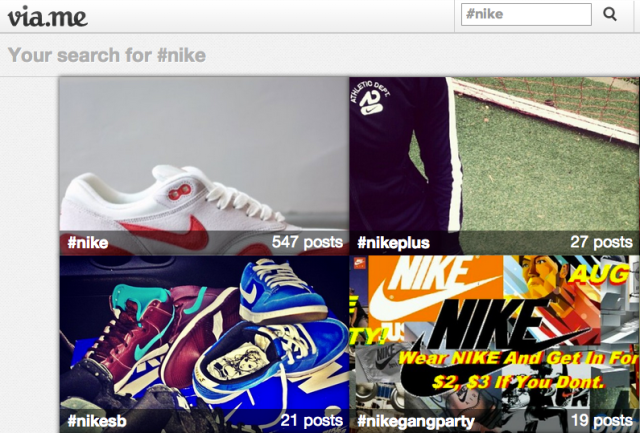Startups in need of a business model don’t have to drop more ads in their apps. Instead they can drop cookies on anyone who posts or views a hashtag, and get a revenue share from RadiumOne who retargets their users with ads around the web. RadiumOne begins dogfooding today by dropping retargeting cookies from its Pinter-esque site Via.me so advertisers can target users interested in #cars or #Nike.
Cross-web hashtag ad retargeting is brilliant but a bit complicated, so let me walk you through it. It works with Via.me or any site that lets users publish public posts with hashtags and is integrated with RadiumOne’s retargeting platform. Twitter, Pinterest, Instagram, and tons of smaller startups could also use the system. Whenever a user publishes a hashtag, or even views a piece of content labeled with a hashtag, the site can drop a cookie about that hashtag onto the user’s browser.
Then when the user surfs around the web, they’ll end up as one of the 25 billion impressions RadiumOne sees each day across sites that host its retargeted ads. Those sites detect the hashtag cookies on the users’ browser that indicate they’re interested in #fitness or #justinbieber. The site pings RadiumOne, whose real-time bidding platform lets advertisers like Under Armor or Ticketmaster compete to reach those users. The highest bidder gets their hashtag retargeted ad shown, and RadiumOne splits the revenue with the site that dropped the cookie in the first place and the one hosting the ad.

 Hashtag ad retargeting is a big deal for several reasons. First, it lets startups monetize their traction without degrading their user experience. Rather than filling their apps with ads or asking users to pay, RadiumOne can help them earn money for dropping invisible cookies. That lets startups concentrate on growth, avoid hiring sales teams, and supplement their funding. “This is what Instagram should be doing. Twitter would be getting double-digit millions in revenue at least”, RadiumOne founder and CEO Gurbaksh Chahal says. For now the system is in place on Via.me, which brings in 10 million photo posts per month.
Hashtag ad retargeting is a big deal for several reasons. First, it lets startups monetize their traction without degrading their user experience. Rather than filling their apps with ads or asking users to pay, RadiumOne can help them earn money for dropping invisible cookies. That lets startups concentrate on growth, avoid hiring sales teams, and supplement their funding. “This is what Instagram should be doing. Twitter would be getting double-digit millions in revenue at least”, RadiumOne founder and CEO Gurbaksh Chahal says. For now the system is in place on Via.me, which brings in 10 million photo posts per month.
More generally, hashtag retargeting creates a whole new way for advertisers to reach users who’ve shown explicit interest in their product. Chahal tells me that says that when they post hashtags “a consumer is allowing themselves to be tagged and discovered” by advertisers. If you post photos of you running on Via.me and tag them #running, or even view them, you’re probably a high-value customer to any fitness company. The data is fresh, opposed to basing ad targeting on something like Facebook Likes, which could be years out of date.
Without hashtag retargeting, a publisher’s site has little idea of who exactly its visitors are. With it, they and the cookie-dropper can both generate revenue. Chahal says “Advertisers renew at a massive rate”, demonstrating that the ads perform well.
Suddenly the March 2012 launch of a consumer image sharing site like Via.me by a programmatic ads company like RadiumOne makes a lot more sense. Chahal explains that a few years ago he settled on the strategy of “we’re not going to deal with third-party data, we’re going to build our own products.” RadiumOne earn some cash from dropping cookies at Via.me, but it also shows off the potential of its platform-agnostic retargeting system.
As social media matures and consumer tech gets more crowded, startups may care less about raw numbers of users and more about actually earning money. Chahal says “I think the big thing we’ll see in 2012 is companies moving away from vanity metrics” and towards real measures of revenue driving potential. Not everyone’s a fan of ads or especially retargeting, but the fact is that ad revenue is the lifeblood of consumer tech, and RadiumOne can pump it into any app with hashtags.
